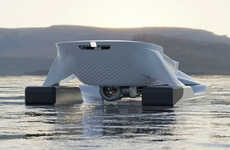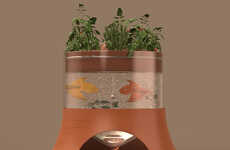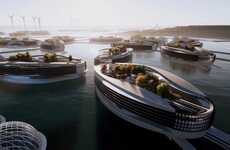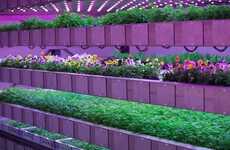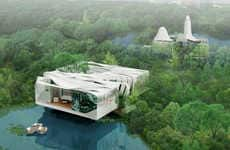
'Floating Responsive Agriculture' Will Likely be Tested in Singapore
Jamie Danielle Munro — July 19, 2014 — Eco
References: atjapa & designboom
Floating Responsive Agriculture is a project developed by Forward-Thinking Architecture, set to be tested in Singapore.
With the world's population constantly increasing, the future is looking more and more grim when it comes to food production. To try and provide a solution to this, Forward-Thinking Architecture have developed these floating agricultural systems that produce food for the public. The idea to test this in Singapore came about because of the floating fish markets that used to be in the area. There is plenty of water for the systems to be built on, and an interconnected system is easier because the nation is quite small.
Perhaps this is what farms will look like in the future.
Photo Credits: designboom, atjapa
With the world's population constantly increasing, the future is looking more and more grim when it comes to food production. To try and provide a solution to this, Forward-Thinking Architecture have developed these floating agricultural systems that produce food for the public. The idea to test this in Singapore came about because of the floating fish markets that used to be in the area. There is plenty of water for the systems to be built on, and an interconnected system is easier because the nation is quite small.
Perhaps this is what farms will look like in the future.
Photo Credits: designboom, atjapa
Trend Themes
1. Floating Responsive Agriculture - Disruptive innovation opportunity: Implementing floating agricultural systems can provide a sustainable solution for food production in areas with limited land resources.
2. Increased Food Production - Disruptive innovation opportunity: Expanding floating farming systems can help meet the growing demand for food as the global population continues to increase.
3. Interconnected Aquatic Farming - Disruptive innovation opportunity: Developing an interconnected system of floating farms can enhance efficiency in food production by leveraging water resources effectively.
Industry Implications
1. Agriculture - Disruptive innovation opportunity: The agricultural industry can explore the use of floating farming systems to optimize food production and mitigate land limitation challenges.
2. Architecture - Disruptive innovation opportunity: Architects and designers can contribute by designing sustainable and efficient floating agricultural systems to support future food production needs.
3. Urban Planning - Disruptive innovation opportunity: Urban planners can incorporate floating farming systems into city development plans to address the growing need for sustainable and localized food production.
6.9
Score
Popularity
Activity
Freshness

